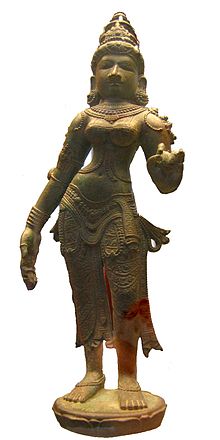
Back Devi ALS ديڤي Arabic ديڤى (اله) ARZ দেৱী Assamese Devi BCL देवी (हिंदू धर्म) Bihari দেবী (হিন্দুধর্ম) Bengali/Bangla Devi BS Devi (hinduisme) Catalan Déví Czech

Devī (/ˈdeɪvi/; Sanskrit: देवी) is the Sanskrit word for 'goddess'; the masculine form is deva. Devi and deva mean 'heavenly, divine, anything of excellence', and are also gender-specific terms for a deity in Hinduism.
The concept and reverence for goddesses appears in the Vedas, which were composed around the 2nd millennium BCE. However, they did not play a vital role in that era.[1] Goddesses such as Durga, Kali, Lakshmi, Parvati, Radha, Saraswati, and Sita have continued to be revered in the modern era.[1] The medieval era Puranas witness a major expansion in mythology and literature associated with Devi, with texts such as the Devi Mahatmya, wherein she manifests as the ultimate truth and supreme power. She has inspired the Shaktism tradition of Hinduism. Further, Devi is viewed as central in the Hindu traditions of Shaktism and Shaivism.[1][2]
© MMXXIII Rich X Search. We shall prevail. All rights reserved. Rich X Search